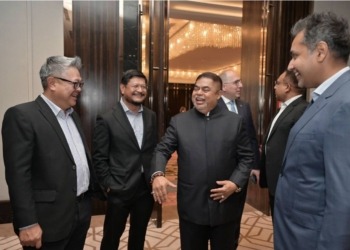The FINANCIAL — The Global Compact Board, the United Nations’ highest-level advisory body involving business and civil society, met at UN Headquarters in New York today for its first meeting of the year.
Due to his travel schedule, UN Secretary-General Ban Ki-moon, who is also the Board’s chair, was unable to attend the meeting. Deputy Chef de Cabinet Kim Won-soo opened the Board meeting on the Secretary-General’s behalf. In a message read by Mr. Kim, the Secretary-General welcomed new Board members Juan De La Mota (Spain), Charles Holliday (US), Cecilia Ibru (Nigeria), Chey Tae-won (Republic of Korea), Fernando Chico Pardo (Mexico), Jean Rozwadowski (France), and Jamshed Irani (India), who had been appointed earlier this year, bringing the Board to a new total of 24 members.
"Noting the Board’s work and progress on human rights, labour and anti-corruption, the Secretary-General asked Board members to intensify their efforts, especially leading up to the third Global Compact Leaders Summit, to be held in June 2010 in New York. He further asked Board members to lend their voice to the UN's Seal the Deal! campaign for a fair, balanced and effective climate agreement in Copenhagen," Global Compact reported.
Referring to the Global Compact’s integrity measures, a key item on the meeting’s agenda, the Secretary-General expressed his hope that Board members will “ensure that the accountability of the Compact is consistent with its mandate and resources”.
As part of the day’s comprehensive agenda, Board members agreed on the creation of a new working group on environmental stewardship, to be chaired by DuPont Chairman Chad Holliday. The working group will seek to build on synergies between the Global Compact’s existing engagement platforms on climate change (Caring for Climate) and water (The CEO Water Mandate). The working group also aims to garner further business support for the UN’s climate agenda, especially in the lead-up to the critical UN Climate Change Conference (COP 15) in Copenhagen in December.
Board members also reaffirmed and supported the Global Compact's recent work to define responsible investment in conflict-affected countries. As in the case of Sudan. the Board welcomed efforts to build Local Networks, involving business and civil society, to advance peace and development.
Regarding the Global Compact’s integrity measures, the Board Board confirmed the Global Compact's approaches in promoting transparency, public accountability and dialogue. The initiative's disclosure (Communication on Progress), brand management and dialogue facilitation policies were reviewed in detail and a number of refinements were agreed upon, especially with regard to the promotion of dialogue and the way the initiative supports other initiatives and instruments.






























Discussion about this post